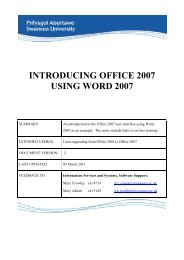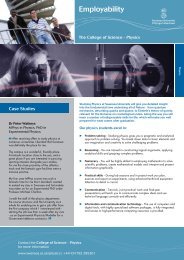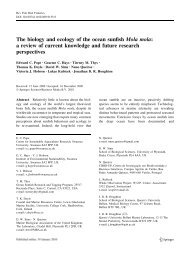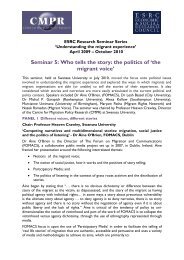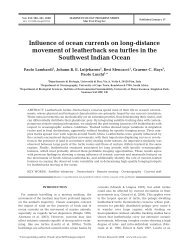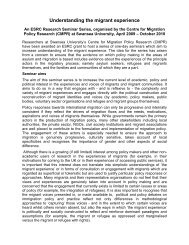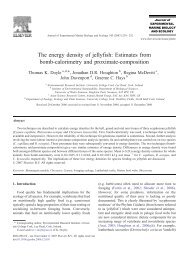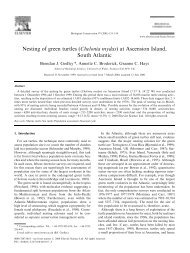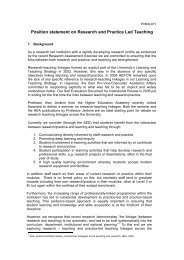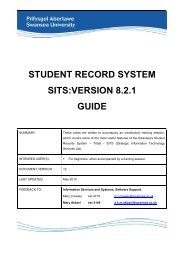Postgraduate Prospectus 2013 - Swansea University
Postgraduate Prospectus 2013 - Swansea University
Postgraduate Prospectus 2013 - Swansea University
You also want an ePaper? Increase the reach of your titles
YUMPU automatically turns print PDFs into web optimized ePapers that Google loves.
Economics<br />
Research opportunities<br />
MPhil/PhD<br />
RAE2008 60% of research<br />
rated world-leading (4*) or internationally<br />
excellent (3*)<br />
Professors<br />
D Blackaby<br />
S Cook<br />
I Jeffries<br />
P Lawler<br />
D Leslie<br />
P Murphy<br />
A E H Speight<br />
J G Treble<br />
The study of economics provides the skills<br />
and knowledge required for a range of<br />
financially rewarding careers. It also<br />
helps in understanding more fully the<br />
world in which we live and work.<br />
The Department welcomes proposals for<br />
postgraduate research projects that<br />
complement the staff research interests<br />
detailed below.<br />
Research degrees in Economics will:<br />
• provide you with new and specialised<br />
research skills<br />
• equip you with skills relevant for a<br />
rewarding career as a professional<br />
economist, analyst, researcher or<br />
adviser<br />
• equip you for roles in management<br />
consultancy, or in the finance or<br />
accountancy sectors<br />
• prepare you for a career in academic<br />
research and teaching<br />
The Economics Department provides<br />
supervised research for postgraduate<br />
study, leading to the degree of MPhil or<br />
PhD, which has ESRC recognition. The<br />
MPhil degree is typically two-years<br />
full-time, whilst the PhD is three-years<br />
full-time. <strong>Postgraduate</strong> students have<br />
access to dedicated IT facilities within both<br />
Academic and research staff 20<br />
<strong>Postgraduate</strong>s 67<br />
Entry requirements:<br />
MPhil: normally hold a first- or upper<br />
second-class degree in Economics,<br />
or a related subject.<br />
PhD: a Master’s degree in Economics<br />
or a related subject is required.<br />
the <strong>University</strong>’s Library and Information<br />
Centre and the College of Business,<br />
Economics and Law: The College has<br />
extensive PC and multi-user computer<br />
facilities which give students access to a<br />
wide range of software including the latest<br />
Microsoft packages, statistical packages<br />
such as SPSS and SAS, and a range of<br />
specialist Business and Economics<br />
software including Nvivo, EViews, STATA<br />
and Datastream.<br />
Additional software and support is<br />
available through the <strong>University</strong>’s central<br />
Information Services and Systems (ISS).<br />
This includes a comprehensive digital<br />
library of resources which includes iFind<br />
Research, official publications and<br />
journals, library catalogues, Athens and a<br />
comprehensive online reference collection.<br />
Research Strengths<br />
The current research work of<br />
the Department covers a broad<br />
range of theoretical and applied<br />
economics, including:<br />
• Applied econometrics<br />
• Development economics<br />
• Financial economics<br />
• Industrial organisation and<br />
technological change<br />
• Labour economics<br />
English Language requirement:<br />
IELTS 6.5 (minimum of 6.0 in each<br />
component) or <strong>Swansea</strong> <strong>University</strong><br />
recognised equivalent.<br />
Scholarships and Bursaries<br />
A range of postgraduate scholarships and<br />
bursaries is available. For details, please<br />
visit www.swansea.ac.uk/postgraduate/<br />
scholarships<br />
• Macroeconomic theory and policy<br />
• Public economics<br />
• Regional economics<br />
• Transition economics<br />
Economics has a number of established<br />
research groups which provide focus and<br />
support to ongoing research programmes.<br />
Labour and Regional Economics<br />
Labour and Regional Economics are major<br />
research groups within the Department.<br />
The research undertaken is both applied<br />
and theoretical in nature but also has a<br />
strong public policy focus. The group has<br />
attracted financial support from the ESRC,<br />
a number of government dependants and<br />
the private sector including the EU, the<br />
Department of Trade and Industry, the<br />
Department of Work and Pensions, the<br />
Low Pay Commission, the Sector Skills<br />
Development Agency, the Equality of<br />
Human Rights Commission, the<br />
Department of Justice, the Welsh<br />
Government and BP. Areas of current<br />
research expertises include; economics of<br />
discrimination, economics of disability, the<br />
returns to education, employment tribunals,<br />
regional economics, the economics of<br />
migration, entrepreneurship, innovation<br />
and productivity, housing and evolutionary<br />
economics. The group contains three<br />
established research centres.<br />
How can I find out more?<br />
Visit our website:<br />
www.swansea.ac.uk/economics<br />
Contact the Admissions Tutor:<br />
Email: B.Ouattara@swansea.ac.uk<br />
Tel: +44 (0)1792 602112<br />
Spatial Economics Research Centre<br />
(SERC)<br />
This is a collaboration with the London<br />
School of Economics (lead institution),<br />
Glasgow, Newcastle and Oxford. The<br />
Centre seeks to explain why there are<br />
disparities in economic growth and<br />
prosperity at different spatial levels<br />
including regional, city-region, local<br />
and individual neighbourhoods.<br />
Wales Institute of Social and Research<br />
Data and Methods (WISERD)<br />
A collaboration with Cardiff (lead<br />
institution), Aberystwyth, Bangor and<br />
Glamorgan universities, this<br />
multidisciplinary research centre aims to<br />
increase collaborative interdisciplinary<br />
research in Wales.<br />
Welsh Economy Labour Market<br />
Evaluation and Research Centre<br />
(WELMERC)<br />
Established in 2002 with funding<br />
from the European Social Fund, this<br />
research centre aims to provide<br />
evidence-based labour market policy<br />
advice. The Centre has strong links<br />
with policy makers and has established<br />
collaborative networks with colleagues<br />
in both the UK and overseas.<br />
Visit the <strong>University</strong>:<br />
see page 174 for details<br />
Applications can be made online<br />
at: www.swansea.ac.uk/applyonline<br />
– see pages 176 – 177 for further<br />
information<br />
For details of the Master’s courses<br />
available in Economics, please see<br />
page 48.<br />
Macroeconomic Theory and Time Series<br />
Econometrics<br />
Macroeconomic theory research focuses<br />
principally on issues relating to central<br />
bank behaviour and optimal monetary<br />
policy design. One aspect of the work of<br />
this group examines the optimal design of<br />
central bank objectives in the context of<br />
economies characterised by highlyunionised<br />
labour markets. Ongoing<br />
research is also examining the extent to<br />
which and in what ways, the design of<br />
monetary policy institutions influences the<br />
incentives for transparency, together with<br />
the question of whether information<br />
provided to the public by the central bank<br />
acts as a substitute or a complement to<br />
privately acquired information.<br />
Time series econometrics is a major area<br />
of work within the Department. In the area<br />
of unit root testing and co-integration<br />
analysis research has been undertaken on<br />
invariant and Lagrange Multiplier based<br />
unit root testing; TAR- and MTAR- based<br />
testing procedures; the development,<br />
examination and application of smooth<br />
transition unit root tests; the behaviour of<br />
modified unit root and co-integration tests<br />
in the presence of outliers and structural<br />
change; and the use of alternative<br />
estimation procedures. This research has<br />
necessitated the extensive use of<br />
numerical simulation procedures to<br />
establish both the properties of existing<br />
testing procedures and derive new<br />
hypothesis tests of interest to the<br />
practitioner. The relevance of the research<br />
undertaken has been emphasised via<br />
application to numerous national and<br />
international economic and financial<br />
time series.<br />
Further details of all of the Economics<br />
research groups can be found at:<br />
www.swansea.ac.uk/economics<br />
Research Degrees – Economics<br />
108<br />
109



